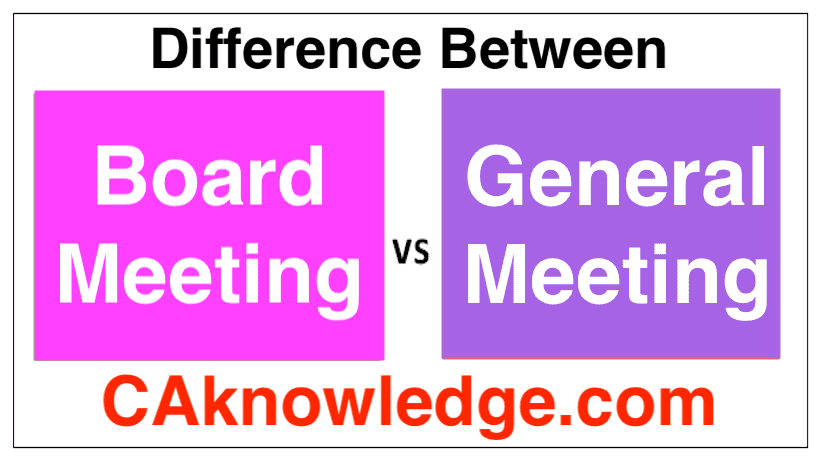Deference Board Meeting And General Meeting. Members of a company or the directors of a company can exercise their powers and can bind the company only when they act as a body at a validly convened and held meeting. An individual member or shareholder, irrespective of his shareholding cannot bind a company by his individual act. In Companies Act, 2013, a new concept of e-voting is introduced. This is a method of voting via electronic means.
The Central Government has been empowered to prescribe the class or classes of companies and the manner in which a member may exercise his rights to vote by the electronic means given under Rule 20 Companies (Management and Administration) Rules, 2014. It is to be noted that every gathering or assembly does not constitute a meeting. The meetings must be convened and held in perfect compliance with the various provisions of the Companies Act, 2013 and rules framed thereunder.
Meetings of the Board
Section 173 of the Act deals with Meetings of the Board and Section 174 deals with quorum.
- The Act provides that the first Board meeting should be held within thirty days of the date of incorporation
- In addition to the first meeting to be held within thirty days of the date of incorporation, there shall be minimum of four Board meetings every year and not more one hundred and twenty days shall intervene between two consecutive Board meetings Further Secretarial Standard 1 (SS-1) issued by ICSI clarifies that the Board shall meet at least once in every calendar quarter, with a maximum interval of one hundred and twenty days between any two consecutive Meetings of the Board SS also states that it shall be sufficient that in the year of incorporation if a company, in addition to the first meeting to be held within thirty days of the date of incorporation, holds one meeting in every remaining calendar quarter in the year of incorporation
- In case of One Person Company (OPC), small company and dormant company, at least one Board meeting should be conducted in each half of the calendar year and the gap between two meetings should not be less than Ninety days.
- In case of Section 8 Company, after MCA exemptions Notification Dated 05.06.2015, the provision of Section 173(1) shall apply only to the extent that the Board of Directors, of such Companies shall hold at least one meeting within every six calendar months.
Note: With regard to Section 8 companies this section shall apply only to the extent that the Board of Directors, of such Companies shall hold at least one meeting within every six calendar months
Advertisement
Content in this Article
Deference Board Meeting And General Meeting
| BOARD MEETING | GENERAL MEETING |
| Notice Must be sent at least 7 days before the date of meeting | Notice Must be sent at least 21 days before the date of meeting |
| Quorum is 1/3rd Directors or 2 whichever is higher | It depends on the number of members of the company. Public Company : 5 and Private Company: 2 |
| Board Meeting is for Directors | General Meeting is for members of company |
| Minimum 4 Board Meetings in a years should be held | AGM: 1 EGM: no such Limit on number of meetings |
| 1st Board meeting should be held within 30 days of incorporation | 1st AGM shall be held within 9 months of incorporation |
| Gap between two board meeting should not be more than 120 days | Gap between two board meeting should not be more than 15 months |
| Board meetings can be attended by director through video conferencing | Members cannot attend general meetings through video conferencing |
General Meeting
A meeting may be generally defined as a gathering or assembly or getting together of a number of persons for transacting any lawful business. There must be atleast two persons to constitute a meeting. Therefore, one shareholder usually cannot constitute a company meeting even if he holds proxies for other shareholders. However, in certain exceptional circumstances, even one person may constitute a meeting.
It is to be noted that every gathering or assembly does not constitute a meeting. Company meetings must be convened and held in perfect compliance with the various provisions of the Companies Act, 2013 and the rules framed thereunder.
A company is composed of members, though it has its own entity distinct from members. The members of a company are the persons who, for the time being, constitute the company, as a corporate entity. However, a company, being an artificial person, cannot act on its own. It, therefore, expresses its will or takes its decisions through resolutions passed at validly held Meetings. The primary purpose of a Meeting is to ensure that a company gives reasonable and fair opportunity to those entitled to participate in the Meeting to take decisions as per the prescribed procedures.
The decision making powers of a company are vested in the Members and the Directors and they exercise their respective powers through Resolutions passed by them. General Meetings of the Members provide a platform to express their will in regard to the management of the affairs of the company.
Convening of one such meeting every year is compulsory. Holding of more general meetings is left to the choice of the management or to a given percentage of shareholders to exercise their power to compel the company to convene a meeting. Shareholder Democracy, Class Action Suits and Protection of interest of investors are the essence and attributes of the Companies Act, 2013.

